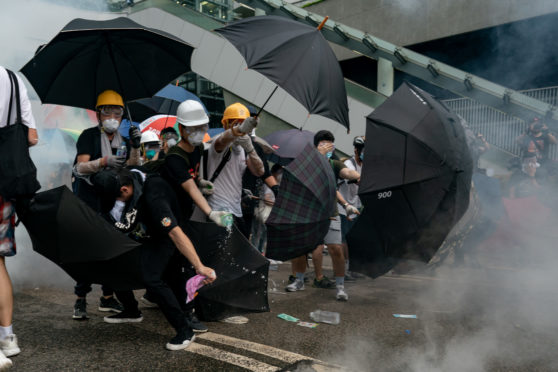
It was no surprise when more than one million angry Hong Kong citizens took to the streets last week.
Waving umbrellas as symbols of protest, they marched against their puppet government’s proposal to allow extradition to China of anyone they or their masters in Beijing suspect of being a critic.
The government, fearful of more massive protests today, suspended the plans yesterday. The chief executive Carrie Lam’s decision might stave off crisis for now, but for how long?
Last week’s peaceful demos quickly turned violent when the security forces cracked down after Lam, the former UK colony’s pro-Beijing leader, called them “organised riots”.
What was surprising, given China’s lamentable human rights record and their hatred of western-style democracy, is that it had taken them so long to interfere and dictate the governance of Hong Kong.
I thought the sun would have set on this mighty Pearl of the East back in 1997 when the UK’s lease of their money-spinning colony had run its course and it was reluctantly forced to hand back the keys to their communist landlords, The People’s Republic of China.
That, once the stiff-upper-lipped Brits had blown their last retreat and headed for home, all of China’s diplomatic assurances to protect Hong Kong’s autonomous legal system and its unique world economic status, as well as the human rights and the democratic freedoms of its citizens would not have been worth the paper they were written on.
When it comes to repression and stamping out dissent, they have form. From the military takeover of peaceful Tibet to the purge of student demonstrators in Tiananmen Square, the Chinese state has never been known for its tolerant, merciful spirit.
But when it came to the initial transfer of power in Hong Kong, my fears were unfounded. There was no military takeover, no crackdown, no bloodbaths on the streets, no human cargo being shipped off to internment camps to join with tens of thousands of other innocent people being “re-educated”.
There was a relatively smooth transition. The Chinese kept to their word and the seven million inhabitants of Hong Kong continued to prosper at a pace still unmatched in that region.
Communism and the free market might be ideologies which are seemingly incongruous and very uncomfortable bed-fellows. But the Chinese are anything but daft and were not going to ruin their chances of earning even more billions of yuan by sending in the tanks when they don’t need to.
That was until 2013, when their authoritarian president, Xi Jinping, took control of the country.
Since then, China has gradually increased its military might right across the South Pacific, become the favoured friend and banker of many an African dictator and embarked upon a massive spy satellite space program.
More worryingly, pro-Beijing parties have, with massive Chinese state support, managed to assume control of the Hong Kong Government and state legislature.
And many outspoken critics of the state have found themselves being tailed and monitored, publicly denounced, or had their books and writings removed from shelves.
Some have even been kidnapped and carried across the border to answer for their supposed crimes of state sedition.
So, the people of Hong Kong have more than enough reasons to be worried and are right to take their umbrellas – which have become a symbol of resistance after being used to deflect police pepper spray – demonstrate against this new extradition proposal.
And again, as I pointed out last week, we should stop working ourselves into a lather about democratically-elected leaders such as Donald Trump, but target instead those unelected tyrants like President Xi Jinping of China.
Maybe he should catch up on his Chinese proverbs, particularly this one: “If there is light in the soul, there will be beauty in the person.
“If there is beauty in the person there will be harmony in the house.
“If there is harmony in the house, there will be order in the nation.”

Enjoy the convenience of having The Sunday Post delivered as a digital ePaper straight to your smartphone, tablet or computer.
Subscribe for only £5.49 a month and enjoy all the benefits of the printed paper as a digital replica.
Subscribe